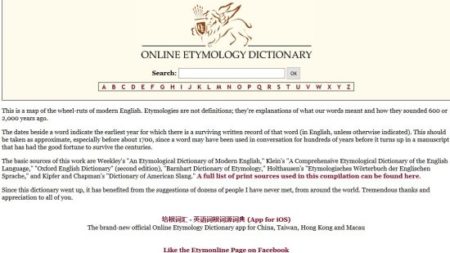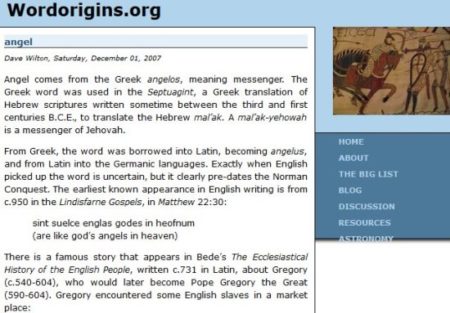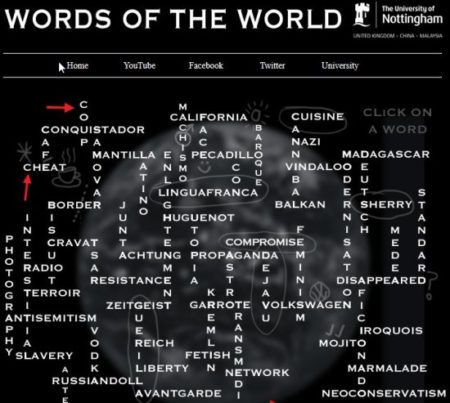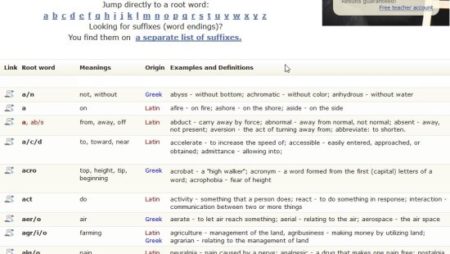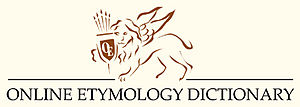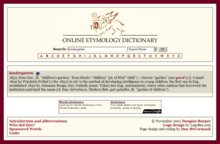We use different languages worldwide to communicate with each other. Every so often we wonder where a word came from. How did a particular word start being used as a common word worldwide and where did it actually originate from. So to find this out we will explore the world of languages and origin of words in this article. This article will cover websites which will let you know the origin of a word.
The study of origin of a word is known as Etymology. You will find that often there are popular tales behind the origin of a word. Most of these tales are just tales and not true, but knowing how the word came into being is equally interesting. So let’s look at these websites to know the origin of words below.
Online Etymology Dictionary
Online etymology dictionary explains you the origin of words and what they meant along with how they would have sounded years back. You would see a date beside each word. This date represents the earliest evidence of this word being used in some sort of written manuscript. Now you can either search for a word you are looking for by typing it in the search box given at the top of the page, otherwise you can browse the words alphabetically. The website has a huge collection of words in it. You can go through the words and find out there origins and meanings as well.
Word Origins by English Oxford Living Dictionaries
Word Origins by English Oxford Living Dictionaries is a good website to know about a words origin. You can check out origin of a word or a phrase. You can search for the word or a phrase you are looking for or can even browse the page to know origin of different words. The website apart from this has a dictionary, thesaurus, grammar helper, etc. As this app has a dictionary, it proves to be a good source for knowing the origin of a word. You can see trending words when you scroll down the page. You can also subscribe to the newsletter on this website to receive updates regarding new words, phrases, etc.
Wordorigins.org
The website Wordorigins.org will let you know the origin of words and phrases. The website has a big list of words which you can go through, or even search for a particular word that you are looking for. The website also has a blog and discussion forum where people can discuss there views. You can login and become a member of the website so you receive regular updates from the website. You can either start browsing words by going to the big list words tab, or by searching for a word. The big list of words is in alphabetical order and there are about 400 words in here. Each word has a interesting story or folklore related to it.
Words of the World
Words of the World is a website which lets you watch videos to let you know the origin of a word. The website explains which language a word originated from through a video. The home page of the website will have a list of words for which you can see a video explaining how the word originated. The words on the home page are given in the format as shown in the screenshot above, but they can also be turned into a neat list if you like. The website is supported by the University of Nottingham and thus is a trusted source.
Learning Nerd
Learning Nerd is another website which has a section on English etymology resources. The website lists references to origin of words like there are word origin dictionaries listed, words with Greek and Latin roots are under a different category, words originating from around the world can be found under international words, and then there is a section for miscellaneous words. You can also play etymology quizzes and listen to etymology podcasts as well. The website itself doesn’t have much information about word origins but will redirect you to another website for your word needs.
Learn That Word
Learn That Word is another website which lists root words and prefixes. The website is pretty basic and a list of words can be seen right on the first page. The words are listed alphabetically, so you can even jump to a word that you are looking for easily. The website will list the root word, its meaning, its place of origin, and then definition and examples. This can be seen in the screenshot above.
These are the websites I found which let you know the origin of a word. Go through them and let me know which one you liked most. If you think there is a website which could be included in this article then leave a comment below.
607
Previews
12
Favorites
Purchase options
Better World Books
DOWNLOAD OPTIONS
No suitable files to display here.
14 day loan required to access EPUB and PDF files.
IN COLLECTIONS
Books to Borrow
Books for People with Print Disabilities
Internet Archive Books
Scanned in China
Uploaded by
AngelaC-loader
on October 28, 2010
Желающим изучать истоки английского языка, исторические вехи его формирования и развития важно иметь словник подобного рода. Этимологический словник представляет собой сборник наиболее часто употребляемых слов, в котором приведены данные о происхождении, видоизменении, первоначальном звучании представленных словесных единиц. Каждое слово имеет свой информационный блок, который состоит из информации следующего характера: сначала описывается происхождение слова, указывается его первоначальная форма, затем приводятся данные об основных изменениях, которые происходили со словом в течении всего времени пользования словесной единицей. В словнике прекрасно разобраны основные исторические модификации слова.
Отдельным «плюсом» этимологического словаря являет то, что в нем детально разобраны и указаны связи активной лексики с истинно английской лексикой или заимствованными словами из других языков. Словарь включает в себя как активную английскую лексику, так и устаревшие слова, забытые, древние, и заимствованные слова из других языков. Последним дается описание не только английского варианта трактовки, но и приведен «родной» контекст использования слова в языке, откуда оно было заимствовано.
Настоящий этимологический словник прекрасно подойдет преподавателям английского языка и студентам инязов, а также все тем, кто более глубоко изучает язык и стремится погрузиться в истоки английской словесности. Единственным условием использования данного словаря является свободное понимание английского языка. Словарь дает возможность не только обогатить словарный запас изучающих язык, но и приоткрыть завесу над тайнами образования английской словесности. Став владельцем данного словаря, вы получите дополнительные знания о языке, который изучаете.
etymology
study of the history of words
Abused, Confused, & Misused Words by Mary Embree Copyright © 2007, 2013 by Mary Embree
et·y·mol·o·gy
(ĕt′ə-mŏl′ə-jē)
n. pl. et·y·mol·o·gies
1. The origin and historical development of a linguistic form as shown by determining its basic elements, earliest known use, and changes in form and meaning, tracing its transmission from one language to another, identifying its cognates in other languages, and reconstructing its ancestral form where possible.
2. The branch of linguistics that deals with etymologies.
[Middle English etimologie, from Old French ethimologie, from Medieval Latin ethimologia, from Latin etymologia, from Greek etumologiā : etumon, true sense of a word; see etymon + -logiā, -logy.]
American Heritage® Dictionary of the English Language, Fifth Edition. Copyright © 2016 by Houghton Mifflin Harcourt Publishing Company. Published by Houghton Mifflin Harcourt Publishing Company. All rights reserved.
etymology
(ˌɛtɪˈmɒlədʒɪ)
n, pl -gies
1. (Linguistics) the study of the sources and development of words and morphemes
2. (Linguistics) an account of the source and development of a word or morpheme
[C14: via Latin from Greek etumologia; see etymon, -logy]
etymological adj
ˌetymoˈlogically adv
ˌetyˈmologist n
Collins English Dictionary – Complete and Unabridged, 12th Edition 2014 © HarperCollins Publishers 1991, 1994, 1998, 2000, 2003, 2006, 2007, 2009, 2011, 2014
et•y•mol•o•gy
(ˌɛt əˈmɒl ə dʒi)
n., pl. -gies.
1. the history of a particular word or element of a word.
2. an account of the origin and development of a word or word element.
3. the study of historical linguistic change, esp. as manifested in individual words.
[1350–1400; Middle English < Latin etymologia < Greek etymología; see etymon, -logy]
et`y•mo•log′i•cal (-məˈlɒdʒ ɪ kəl) adj.
et`y•mo•log′i•cal•ly, adv.
et`y•mol′o•gist, n.
Random House Kernerman Webster’s College Dictionary, © 2010 K Dictionaries Ltd. Copyright 2005, 1997, 1991 by Random House, Inc. All rights reserved.
etymology
the branch of linguistics that studies the origin and history of words. — etymologist, n. — etymologie, etymological, adj.
See also: Language
the study of the origin and history of individual words. — etymologist, n. — etymological, adj.
See also: Linguistics
-Ologies & -Isms. Copyright 2008 The Gale Group, Inc. All rights reserved.
etymology
1. The study of the origins and development of words.
2. The study of the history of words, tracing them back to their earliest recorded forms.
Dictionary of Unfamiliar Words by Diagram Group Copyright © 2008 by Diagram Visual Information Limited
По строгой терминологии, этимологический словарь английского языка — это словарь, описывающий происхождение часто используемых слов (лексики), морфем в определенном языке. Ученые-языковеды указывают еще и источники, предпосылки к появлению того или иного слова.
Итого: слова в таких справочниках рассматриваются с точки зрения исторического развития. Исследуется изменение значения конкретного слова, которое могло в 15 веке звучать и означать одно понятие, а сегодня приобрело другой вид и смысл.
Замечу, что в последние 20 лет в крупных толковых словарях как русского, так и английского языка, стали кратко описывать, откуда появилось слово. Тенденция, несомненно, хорошая.
Этимологический словарь английского языка онлайн и скачать
- Известный лингвистический портал — http://www.etymonline.com/. Мы советуем именно этот источник. Он базируется на таких источниках как Weekley’s «An Etymological Dictionary of Modern English,» Klein’s «A Comprehensive Etymological Dictionary of the English Language,» «Oxford English Dictionary» (second edition), «Barnhart Dictionary of Etymology,» Holthausen’s «Etymologisches Wörterbuch der Englischen Sprache,» and Kipfer and Chapman’s «Dictionary of American Slang.» На сайте искать можно по первой букве слова и самому слову, если оно вам известно.
- М. М. Маковский «Историко-этимологический словарь современного английского языка»(Слово в зеркале человеческой культуры) — Скачать
- Harper Douglas. Online Etymology Dictionary — Скачать
Справочники по происхождению слов в English пригодятся при написании курсовых, дипломных работ и рефератов. Основная аудитория словарей — студенты факультетов иностранной филологии, ученики школ с углубленным изучением иностранных языков (особенно английского и немецкого), преподаватели школ, колледжей, вузов.
- Top Definitions
- Synonyms
- Quiz
- Related Content
- Examples
- British
- Scientific
This shows grade level based on the word’s complexity.
[ awr-i-jin, or— ]
/ ˈɔr ɪ dʒɪn, ˈɒr- /
This shows grade level based on the word’s complexity.
noun
something from which anything arises or is derived; source; fountainhead: to follow a stream to its origin.
rise or derivation from a particular source: the origin of a word.
the first stage of existence; beginning: the origin of Quakerism in America.
ancestry; parentage; extraction: to be of Scottish origin.
Anatomy.
- the point of derivation.
- the more fixed portion of a muscle.
Mathematics.
- the point in a Cartesian coordinate system where the axes intersect.
- Also called pole. the point from which rays designating specific angles originate and are measured from in a polar coordinate system with no axes.
QUIZ
CAN YOU ANSWER THESE COMMON GRAMMAR DEBATES?
There are grammar debates that never die; and the ones highlighted in the questions in this quiz are sure to rile everyone up once again. Do you know how to answer the questions that cause some of the greatest grammar debates?
Which sentence is correct?
Origin of origin
1350–1400; Middle English <Latin orīgin- (stem of orīgō) beginning, source, lineage, derivative of orīrī to rise; cf. orient
Words nearby origin
orig., origami, origan, origanum, Origen, origin, original, original equipment manufacturer, originalism, originality, originally
Dictionary.com Unabridged
Based on the Random House Unabridged Dictionary, © Random House, Inc. 2023
Words related to origin
ancestor, ancestry, connection, element, influence, motive, provenance, root, source, birth, genesis, descent, lineage, agent, antecedent, author, base, causality, causation, creator
How to use origin in a sentence
-
I think we can see Liz’s story is sort of an origin point for so many cultural themes today.
-
Its 2018 report, “Reclaiming Native Truth,” explored the perceptions that Americans have of Native people, the origins of those perceptions and the impact that the perceptions have on Native people, particularly children.
-
In speaking with Parents for Peace, however, she began to think more about the origins of his views.
-
The notion of centering my column on “new” revelations about the origins of the Pentagon Papers seemed to be collapsing.
-
The scenario involved one storm, with origins in the Pacific Ocean, that would race across the country, die out over Ohio, and then hand off its energy to a secondary storm developing off the Mid-Atlantic coast.
-
“The origin of Brokpas is lost in antiquity,” a research article from the University of Delhi notes.
-
The mythic origin of the feast was the creation of the world by the god Marduk.
-
Some of the more notorious “green on blue” attacks have their origin in such outraged honor.
-
Black Alice and Strix have origin stories that more closely resemble the archetypal comic heroes.
-
The virus had to come from somewhere, but no one could figure out its origin.
-
Just corporeal enough to attest humanity, yet sufficiently transparent to let the celestial origin shine through.
-
But not only has the name tobacco and the implements employed in its use caused much discussion but also the origin of the plant.
-
A marked increase indicates some pathologic condition at the site of their origin.
-
William King, archbishop of Dublin, died; author of a celebrated treatise on the origin of evil.
-
Carpenter were the leaders, and this is claimed to have been the origin of Mechanics’ Institutes.
British Dictionary definitions for origin
noun
a primary source; derivation
the beginning of something; first stage or part
(often plural) ancestry or parentage; birth; extraction
anatomy
- the end of a muscle, opposite its point of insertion
- the beginning of a nerve or blood vessel or the site where it first starts to branch out
maths
- the point of intersection of coordinate axes or planes
- the point whose coordinates are all zeroSee also pole 2 (def.
commerce the country from which a commodity or product originatesshipment from origin
Word Origin for origin
C16: from French origine, from Latin orīgō beginning, birth, from orīrī to rise, spring from
Collins English Dictionary — Complete & Unabridged 2012 Digital Edition
© William Collins Sons & Co. Ltd. 1979, 1986 © HarperCollins
Publishers 1998, 2000, 2003, 2005, 2006, 2007, 2009, 2012
Scientific definitions for origin
The point at which the axes of a Cartesian coordinate system intersect. The coordinates of the origin are (0,0) in two dimensions and (0,0,0) in three dimensions.
The American Heritage® Science Dictionary
Copyright © 2011. Published by Houghton Mifflin Harcourt Publishing Company. All rights reserved.
From Wikipedia, the free encyclopedia
According to surveys,[1][2] the percentage of modern English words derived from each language group are as follows:
| Latin | ≈29% |
| French | ≈29% |
| Germanic | ≈26% |
| Greek | ≈5% |
| Others | ≈10% |
The following are lists of words in the English language that are known as «loanwords» or «borrowings,» which are derived from other languages.
For Old English-derived words, see List of English words of Old English origin.
- English words of African origin
- List of English words of Afrikaans origin
- List of South African English regionalisms
- List of South African slang words
- List of English words from indigenous languages of the Americas
- List of English words of Arabic origin
- List of Arabic star names
- List of English words of Australian Aboriginal origin
- List of English words of Brittonic origin
- Lists of English words of Celtic origin
- List of English words of Chinese origin
- List of English words of Czech origin
- List of English words of Dravidian origin (Kannada, Malayalam, Tamil, Telugu)
- List of English words of Dutch origin
- List of English words of Afrikaans origin
- List of South African slang words
- List of place names of Dutch origin
- Australian places with Dutch names
- List of English words of Etruscan origin
- List of English words of Finnish origin
- List of English words of French origin
- Glossary of ballet, mostly French words
- List of French expressions in English
- List of English words with dual French and Anglo-Saxon variations
- List of pseudo-French words adapted to English
- List of English Latinates of Germanic origin
- List of English words of Gaulish origin
- List of German expressions in English
- List of pseudo-German words adapted to English
- English words of Greek origin (a discussion rather than a list)
- List of Greek morphemes used in English
- List of English words of Hawaiian origin
- List of English words of Hebrew origin
- List of English words of Hindi or Urdu origin
- List of English words of Hungarian origin
- List of English words of Indian origin
- List of English words of Indonesian origin, including from Javanese, Malay (Sumatran) Sundanese, Papuan (West Papua), Balinese, Dayak and other local languages in Indonesia
- List of English words of Irish origin
- List of Irish words used in the English language
- List of English words of Italian origin
- List of Italian musical terms used in English
- List of English words of Japanese origin
- List of English words of Korean origin
- List of Latin words with English derivatives
- List of English words of Malay origin
- List of English words of Māori origin
- List of English words of Niger-Congo origin
- List of English words of Old Norse origin
- List of English words of Persian origin
- List of English words of Philippine origin
- List of English words of Polish origin
- List of English words of Polynesian origin
- List of English words of Portuguese origin
- List of English words of Romani origin
- List of English words of Romanian origin
- List of English words of Russian origin
- List of English words of Sami origin
- List of English words of Sanskrit origin
- List of English words of Scandinavian origin (incl. Danish, Norwegian)
- List of English words of Scots origin
- List of English words of Scottish Gaelic origin
- List of English words of Semitic origin
- List of English words of Spanish origin
- List of English words of Swedish origin
- List of English words of Turkic origin
- List of English words of Ukrainian origin
- List of English words of Welsh origin
- List of English words of Yiddish origin
- List of English words of Zulu origin
See also[edit]
- Anglicisation
- English terms with diacritical marks
- Inkhorn term
- Linguistic purism in English
- List of Germanic and Latinate equivalents in English
- List of Greek and Latin roots in English
- List of proposed etymologies of OK
- List of Latin legal terms
References[edit]
- ^ Finkenstaedt, Thomas; Dieter Wolff (1973). Ordered profusion; studies in dictionaries and the English lexicon. C. Winter. ISBN 3-533-02253-6.
- ^ Joseph M. Williams (1986) [1975]. Origins of the English Language. A social and linguistic history. Free Press. ISBN 0029344700.[page needed]
External links[edit]
- Ancient Egyptian Loan-Words in English
- List of etymologies of English words
- Online Etymology Dictionary
-
Online Etymology Dictionary
Type Private Founded Online (c.2000) Headquarters Lancaster, PA, USA Key people Douglas Harper, Founder
Dan McCormack, Web Design and codingEmployees 1 Website www.etymonline.com Type of site Etymological dictionary Registration no Available in English Current status active Screenshot
Screenshot of etymonline.comThe Online Etymology Dictionary is an online dictionary that describes the origins of English-language words.[1] The abbreviation, OED, coincides with the frequently used acronym for the Oxford English Dictionary.
Description
Douglas Harper created the etymology dictionary to record the history and evolution of more than 30,000 words, including slang and technical terms.[2]
Reviews and reputation
The Online Etymology Dictionary has been referenced by Ohio University’s Library as a relevant etymological resource[1] and cited in the Chicago Tribune as one of the “best resources for finding just the right word.”[3] It is cited in numerous articles as a source for explaining the history and evolution of words.[4][5][6]
References
- ^ a b Ohio University, Online Etymology Dictionary. Created 2003, http://infotree.library.ohiou.edu/single-records/2705.html, accessed 2007-01-05.
- ^ Online Etymology Dictionary. Accessed December 31, 2006
- ^ Bierma, Nathan. Internet has best resources for finding just the right word. Chicago Tribune, January 3, 2007, republished by www.factiva.com, http://proxy.bib.uottawa.ca:2241/sb/default.aspx?NAPC=S&fcpil=en, accessed 2007-01-05.
- ^ Rudeen, Mike. Any questions?; Ask! away on the News’ new blog. Rocky Mountain News, December 18, 2006, republished by www.factiva.com, accessed 2007-01-05
- ^ Murali, D. Big results require big ambitions. Business Line (The Hindu), July 21, 2006, Section:Opinion, republished by Factiva.com, accessed 2007-01-05
- ^ Whyte, Ellen. Online resources to help improve your vocabulary. New Straits Times, October 27, 2005, republished by www.factiva.com, accessed 2007-01-05
External links
- Online Etymology Dictionary
Categories:
- Etymological dictionaries
- Etymology
- Online dictionaries
Wikimedia Foundation.
2010.
Look at other dictionaries:
-
Etymology — Etymologies redirects here. For the encyclopedia, see Etymologiae. For the Elvish dictionary, see The Etymologies (Tolkien). Not to be confused with Entomology or Etiology. For help writing an etymology on Wikipedia, see Template:Etymology … Wikipedia
-
Etymology of Pittsburgh — Inside of the rotunda of Union Station in Pittsburgh showing the spelling as of 1900. The name of the city of Pittsburgh, Pennsylvania has a complicated history. Pittsburgh is one of the few U.S. cities or towns to be spelled with an h at the end … Wikipedia
-
Etymology of Scotland — The founders of Scotland of late medieval legend, Scota with Goídel Glas, voyaging from Egypt, as depicted in a 15th century manuscript of the Scotichronicon of Walter Bower. Scotland (Scottish Gaelic: Alba pronounced … Wikipedia
-
Dictionary — For other uses, see Dictionary (disambiguation). For Wikimedia s dictionary project visit Wiktionary, or see the Wiktionary article. A multi volume Latin dictionary by Egidio Forcellini. A dic … Wikipedia
-
Witch (etymology) — The etymology of the word witch traces back to the Old English language with the German and Indo European languages as possible older sources. Germanic etymologyThe word witch derives from the Old English nouns IPA|/ˈwitʧɑ/ (masc.) sorcerer,… … Wikipedia
-
Etymological dictionary — An etymological dictionary discusses the etymology of the words listed. Often, large dictionaries, such as the OED and Webster s, will contain some etymological information, without aspiring to focus on etymology.Etymological dictionaries are the … Wikipedia
-
Dictionary of American Regional English — Volume I (1985), Volume II (1991), Volume III (1996), Volume IV (2002), Volume V (2012) Country United States … Wikipedia
-
Chemistry (etymology) — In the history of science, the etymology of the word chemistry is a debatable issue. It is agreed that the word derives from the word alchemy, which is a European one, derived from the Arabic al kīmīā (الكيمياء). The Arabic term is derived from… … Wikipedia
-
dictionary — /dik sheuh ner ee/, n., pl. dictionaries. 1. a book containing a selection of the words of a language, usually arranged alphabetically, giving information about their meanings, pronunciations, etymologies, inflected forms, etc., expressed in… … Universalium
-
Advanced Learner’s Dictionary — An advanced learner s dictionary is a monolingual learner s dictionary, that is, a dictionary written for non native speakers. It differs from a bilingual or translation dictionary, on the one hand, and a standard dictionary written for native… … Wikipedia

